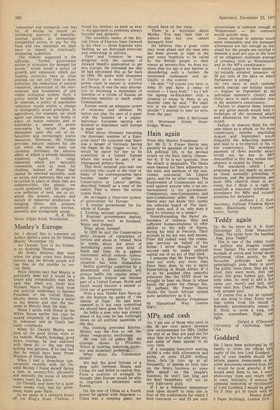Job no job
From Lieut-Col H. R. Pelly Sir: According to The Spectator's editorial (November 20) it is often claimed that the scale of unemployment benefits is now so generous that many people do not mind being unemployed. To anyone who reads the newspapers, or looks into shop windows and observes the number of advertisements of going employment. of various kinds it must be obvious that the claim is valid. But the statement that "few people mind other people being unemployed ". is more debatable. There is a growing resentment among employed workers at having to pay, through taxation, for the support of men with large families who find it more lucrative to draw unemployment benefits, supplemented by occasional odd jobs, than to accept regular employment.
With the advent of automation increasing numbers of manual workers are becoming redundant and if this process is to continue, as seems certain, the time will surely come when those who work will refuse to support those who remain voluntarily idle. What is the remedy? In the long term there is only one: reduction of our population to a size that we can feed on home grown food. Only when we can do this shall we be freed from the necessity, whatever the envi ronmental and ecological cost may be, of having to export an increasing quantity of manuf acturered goods, at increasingly competitive prices, to pay for the food and raw materials we shall have to import in continually increasing quantities.
The remedy suggested in the editorial, "further government action to stimulate the demand for goods," would entail a policy of growth and expansion which our leading scientists have so often pointed out can only lead to more pollution, the exhaustion of natural resources, destruction of the environment and breakdown of any viable ecological system. Such a policy would be one of madness. In contrast, a policy of population reduction would enable a change to ecologically sound principles. In agriculture, for example, we could again use horses on our farms in place of motor vehicles and so substitute a source of power renewable by nature for one dependent upon the use of exhaustible and increasingly scarce resources. Moreover, the former provides natural manure for the soil while the latter must use chemical fertilisers the adverse effect of which is already becoming apparent. Again, by using materials which are naturally renewable, such as wool, for clothing, instead of those that cannot be renewed naturally, such as nylon, and materials that can be re-cycled in place of those that are indestructible, like plastic, we could gradually halt the progressive pollution of land, sea or air, which the present volume and nature of industrial production is bringing about, and promote methods of production environmentally and ecologically sound.
H. R. Polly Novar Edgar Road, Winchester











































 Previous page
Previous page